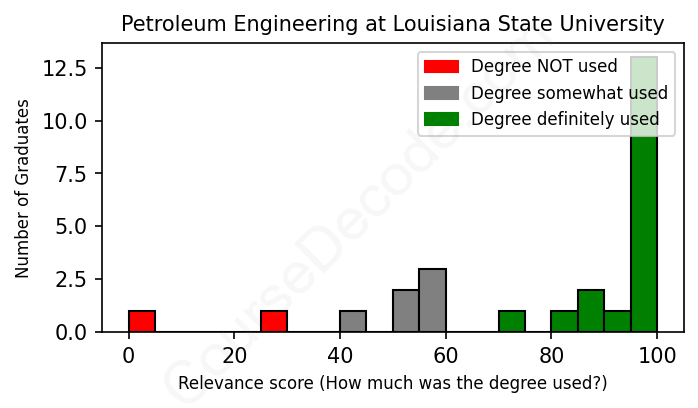
First, some facts. Of the Petroleum Engineering graduates from Louisiana State University we've analyzed , here's how many have used (or NOT used) their degree in their career:

These are estimates based on AI analysis of 26 LinkedIn profiles (see below).
The verdict? Significantly above average. Overall, with an average relevance score of 79%, Petroleum Engineering graduates from Louisiana State University have a much higher likelihood (+12%) of finding work in this field compared to the average graduate across all fields:
And for comparison, here's the chart for all profiles we've looked at across all degrees.
Also, after graduating, only 11% of these graduates have pursued further education other than another Bachelor's degree (such as a Masters degree or other), compared to the average across all profiles of 35%. This suggests a Bachelors degree is enough for most Petroleum Engineering graduates, and it's normal to look for work straight after graduation.
See the details:
|
Relevance score: 72% We think this person has gone into a career highly relevant to their degree. We think this person has gone into a career highly relevant to their degree.
DEGREE INFOGraduated in 2019 from Louisiana State University with a Bachelor of Science - BS in Petroleum Engineering. No other secondary education since. JOB HISTORY SINCE GRADUATIONHydraulic Fracturing Field Engineer Schlumberger Jun 2019 - May 2020 Field Engineer  Liberty Oilfield Services Aug 2021 - Jun 2022 Petroleum Engineer  Bureau of Safety and Environmental Enforcement Jun 2022 - Present ABOUTNo information provided. |
The top 10 most common jobs done by the graduates we've analyzed (ranked most common to least) are:
From the list of jobs held by Louisiana State University graduates with Petroleum Engineering degrees, it's clear that most of them have pursued careers closely tied to their field of study. Common positions include Reservoir Engineer, Production Engineer, and various engineering roles at oil and gas companies like Chevron and Schlumberger. Many of these jobs, such as Reservoir Engineer II or Drilling Engineer, directly apply the technical skills and knowledge gained from their academic background, indicating a strong relevance to Petroleum Engineering. Internships and entry-level roles also reflect a clear commitment to the industry, ensuring that graduates make a smooth transition from academic theories to practical applications in real-world settings.
However, as the career timelines progress, some graduates have moved into roles that stray from direct engineering applications. For instance, positions like Associate Sales Representative or Vendor Manager are less relevant as they focus more on business and sales rather than engineering principles. This pattern indicates that while many graduates stay true to their Petroleum Engineering roots initially, some may branch out into managerial or commercial roles that don't require the technical expertise of their degree. Overall, the majority of jobs listed show a very strong connection to Petroleum Engineering, particularly in the early years of a graduate’s career, but there's a noticeable shift towards less relevant roles over time for some individuals.
Here is a visual representation of the most common words in job titles for Petroleum Engineering graduates (this is across all Petroleum Engineering graduates we've analyzed, not just those who went to Louisiana State University):

Graduates of Petroleum Engineering from Louisiana State University generally have a pretty solid career trajectory, especially in the early stages after graduation. Most of them land their first positions as engineers, interns, or field engineers in oil and gas companies, which is a great way to kickstart their careers. For example, many start off working directly in the field or in supportive engineering roles at big names like Chevron, Schlumberger, and Baker Hughes. Over the years, a good number of these professionals remain in the same industry but move into more specialized roles or management positions, reflecting a clear path of growth and development that’s typical in the petroleum sector.
Looking five to ten years down the line, it seems quite a few graduates continue to progress within their companies, taking on roles such as senior engineers, project managers, or even executives at major firms. There’s a nice mix of individuals who stay rooted in traditional petroleum engineering roles and those who branch out into different areas like operations, project management, and even finance within the energy sector. While a small number have ventured into unrelated fields, it’s clear that a large portion remains closely tied to petroleum engineering, proving that a degree from LSU in this field can lead to strong and relevant job opportunities over time.
Getting a Bachelor’s degree in Petroleum Engineering can be pretty challenging, and the program at Louisiana State University is no exception. You’re going to dive into some tough coursework that includes advanced math, physics, and a lot of specialized classes about drilling, reservoir engineering, and production techniques. It’s definitely on the harder side compared to a lot of other majors out there, mainly because it combines complex theories with practical applications. But don’t let that scare you; if you're passionate about the field and ready to work hard, it can also be really rewarding! Just be prepared to put in some serious effort!
Most commonly, in the LinkedIn profiles we've looked at, it takes people 5 years to finish a Bachelor degree in Petroleum Engineering.
Looking at these Petroleum Engineering grads from LSU, it seems like they've generally made some decent money throughout their careers, especially those who took on roles like executives or managers in major companies. For instance, the first person went from intern to Vice President at JPMorgan Chase & Co., which usually means a pretty sweet paycheck. Other grads at companies like Chevron and Shell also landed solid positions that often come with good salaries and benefits, particularly in the engineering sector. Even the ones who’ve stuck with other engineering jobs seem to be doing well, although some have taken longer to climb the ladder. Overall, it looks like a good bet if you're thinking about studying Petroleum Engineering – there’s potential for solid earnings!
Here is a visual representation of the most common words seen in the "about" section of LinkedIn profiles who have a Bachelor degree in Petroleum Engineering (this is across all Petroleum Engineering graduates we've analyzed, not just those who went to Louisiana State University). This may or may not be useful:

Here are all colleges offering a Bachelor degree in Petroleum Engineering (ordered by the average relevance score of their Petroleum Engineering graduates, best to worst) where we have analyzed at least 10 of their graduates:
| College | Score | Count |
|---|---|---|
 Texas A&M University Texas A&M University
|
80 | 25 |
 Louisiana State University Louisiana State University
|
79 | 26 |
 University of Oklahoma University of Oklahoma
|
78 | 20 |
 Texas Tech University Texas Tech University
|
77 | 20 |
 Penn State University Penn State University
|
75 | 11 |
 The University of Texas at Austin The University of Texas at Austin
|
75 | 18 |
 Marietta College Marietta College
|
70 | 20 |
 Colorado School of Mines Colorado School of Mines
|
69 | 30 |
 West Virginia University West Virginia University
|
68 | 10 |
 University of Houston University of Houston
|
67 | 19 |
 University of Louisiana at Lafayette University of Louisiana at Lafayette
|
63 | 10 |